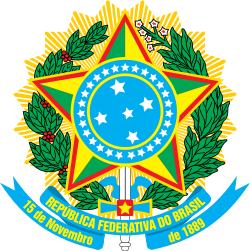National Defense Council (Brazil)
The National Defense Council (CDN) (Portuguese: Conselho de Defesa Nacional) is a consultative body of the President of Brazil on matters of national security, foreign policy, and defence strategy.[1] The Council was established on 29 November 1927 by President Washington Luís.[2] It is composed of key ministers and military commanders and chaired by the President of Brazil.[3]
| Portuguese: Conselho de Defesa Nacional | |
| Council overview | |
|---|---|
| Formed | November 29, 1927 |
| Jurisdiction | Brazil |
| Council executives |
|
 |
|---|
| This article is part of a series on the politics and government of Brazil |
|
|
|
Administrative divisions
|
|
|
History
The National Defense Council was established by Decree no. 17,999 of 29 November 1927,[2] and organized by Decree no. 23,873 of 15 February 1934.[4] It was chaired by the President and composed of several ministers, the Chief of Staff of the Army, the Chief of Staff of the Navy and in wartime, by generals and admirals of certain commands. It had as complementary organs, the National Defense Studies Commission, the General Secretariat of National Defense, and national defense sectors in every government ministry.[5]
The role of the National Defense Council was reaffirmed with the promulgation of the Constitution of 1934. In the portion devoted to national security (Article 162), the National Defense Council was renamed National Security Council.[5] The decree-law no. 900 of 29 September 1969, amended some provisions of decree-law no. 200, and the National Security Council became the "highest-level advisory board to the president of the Republic, in formulating and implementing national security policy".[6] In September 1980, a presidential decree established the internal regulations of the CSN.[7]
The new Constitution ratified in 1988, renamed the National Security Council to National Defense Council.[8]
Responsibilities
The National Defense Council is responsible for advising the President in the event of declaring war or establishing peace, in decreeing state of defense, state of siege or federal intervention; and proposing the criteria and conditions for use of the areas essential to the security of national territory and opine on their effective use, especially in the border and matters related to the preservation and exploitation of natural resources of any kind; as well as studying, proposing and monitoring the development of measures required to guarantee national independence and defense of democratic State.[9]
The Council draws up crucial documents defining conceptual approaches to national security. Regular meetings of the Council are held according to a schedule set by the President; if necessary, the Council can hold extraordinary meetings. The Chairman defines the agenda and order of the day based on recommendations by the Executive Secretary of the Council. The Chairman presides over meetings, while the Secretary holds working meetings with Council members on a regular basis.
Composition
The National Defense Council is headed by the President of Brazil and composed of the following members:[3]
| Structure of the National Defense Council (Current) | |
|---|---|
| Chair | Jair Bolsonaro (President of Brazil) |
| Executive Secretary | Gen. Augusto Heleno (Chief of the Institutional Security Cabinet) |
| Statutory Members | Hamilton Mourão (Vice President of Brazil) Rodrigo Maia (President of the Chamber of Deputies) Davi Alcolumbre (President of the Senate) Fernando Azevedo e Silva (Minister of Defense) Sérgio Moro (Minister of Justice) Ernesto Araújo (Minister of Foreign Affairs) Paulo Guedes (Minister of Economy) |
| Military Advisors | Lt. Brig. Raul Botelho (Chief of the Joint Staff of the Armed Forces) Adm. Ilques Barbosa Junior (Navy Commander) Gen. Edson Leal Pujol (Army Commander) Lt. Brig. Antônio Carlos Moretti Bermudez (Air Force Commander) |
| Additional Participants | The President may appoint additional participants when appropriate. |
References
- Ministério da Defesa - Ministry of Defense Globalsecurity.org. Retrieved on 2010-10-24.
- Decreto nº 17.999, de 29 de Novembro de 1927 Câmara dos Deputados. Retrieved on 2010-10-24. (in Portuguese).
- Constituição da República Federativa do Brasil (1988) - Art. 91 - Do Conselho de Defesa Nacional Archived 2010-12-14 at the Wayback Machine Direito & Justiça Informática. Retrieved on 2010-10-24. (in Portuguese).
- Decreto nº 23.873, de 15 de Fevereiro de 1934 Câmara dos Deputados. Retrieved on 2010-10-24. (in Portuguese).
- Conselho de Segurança Nacional Arquivo Nacional. Retrieved on 2010-10-24. (in Portuguese).
- Art. 40 - Decreto-Lei n. 900 de 29 de Setembro de 1969 Archived 2011-07-06 at the Wayback Machine Dataprev.gov.br. Retrieved on 2010-10-24. (in Portuguese).
- Decreto nº 85.128, de 10 de Setembro de 1980 Câmara do Deputados. Retrieved on 2010-10-24. (in Portuguese).
- O Conselho de Segurança Nacional Archived 2011-07-06 at the Wayback Machine Arquivo Nacional. Retrieved on 2010-10-24. (in Portuguese).
- Conselho de Defesa Nacional Archived 2008-06-11 at the Wayback Machine Presidência da República. Retrieved on 2010-10-24. (in Portuguese)